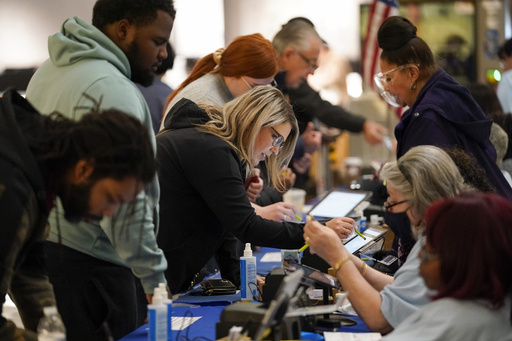Conservative groups are currently engaged in a systematic effort to challenge a large number of voter registrations across the United States ahead of the upcoming presidential election. This strategy is part of a broader campaign that seeks to raise doubts about the integrity of this year’s election, fueled by baseless claims from former President Donald Trump alleging that his opponents are attempting to cheat. Tactics used in the efforts include mass door-knocking campaigns, the utilization of specialized software to identify questionable voter eligibility, and a surge of lawsuits, with some initiated by the Republican National Committee.
Several Republican secretaries of state, including those in Ohio and Tennessee, are actively reviewing voter lists either voluntarily or in response to new voting laws. While those leading the reviews present them as initiatives aimed at enhancing election office operations, voting rights groups and Democrats argue that the true intention is to undermine confidence in the 2024 election results and establish a legal foundation for contesting the outcome.
Various state-level initiatives, such as “Soles to the Rolls” in Michigan and the Pigpen Project in Nevada, involve volunteers scouring state voter rolls for inaccuracies. Discoveries may include deceased individuals, non-U.S. citizens, or voters registered at outdated addresses, all potentially indicative of double-voting. Although conservative activists identify such records, the responsibility for possible removal lies with local or state election offices.
Conservative groups leading the voter roll reviews have engaged in widespread public records requests nationwide to access voter files. Legal challenges have emerged in nearly a quarter of states, with the aim of developing public databases for scrutinizing certain voters’ eligibility. The conservative Public Interest Legal Foundation, helmed by attorney Cleta Mitchell, has initiated challenges in multiple states, while also pursuing lawsuits against entities like the Electronic Registration Information Center (ERIC).
Despite the claims made by groups involved in the voter roll reviews, election law experts emphasize that the issue of ineligible voters casting ballots is exceedingly rare. The Brennan Center for Justice’s Alice Clapman highlights that disinformation surrounding voter rolls undermines trust in election officials and diminishes faith in the essential civic activity of voting, transitioning a once unifying national practice into one marred by suspicion.
